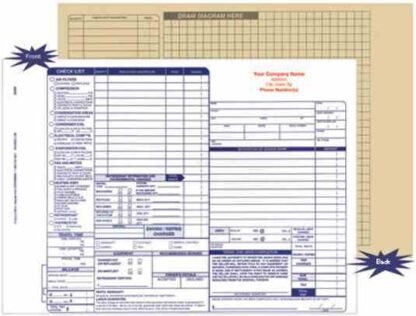Are Printed Business Forms Required?
Exploring the Pros and Cons of Online Forms
In today’s digital age, businesses are often faced with the decision of whether to adopt online forms or stick with traditional printed business forms.
The rise of online form applications has led to claims that printed forms are becoming obsolete. However, the truth is that the choice between these two options depends on the specific needs and circumstances of each business or organization.
In this article, we will delve into the pros and cons of online forms and provide valuable insights to help you make informed decisions.
Understanding Online Forms: Embracing the Digital Era
Online forms are essentially digital versions of traditional printed business forms that can be accessed and submitted through a web browser or mobile device. Their popularity has surged due to perceived convenience, efficiency, and cost-effectiveness. Let’s explore the major selling points of online forms and examine their advantages and disadvantages.
Pros and Cons of Online Forms: Evaluating the Benefits
Eliminating the Need for Printing, Distribution, and Storage
Pros: It is true that online forms save money by eliminating the costs associated with printing, distributing, and storing paper forms.
Cons: However, there are considerations to keep in mind. Companies often incorporate Terms and Conditions into their documents to protect themselves and limit liability. Physical signatures on printed forms provide legal proof of customer agreement. With online forms, the challenge lies in validating the authenticity of electronic signatures during disputes. Additionally, certain forms, such as legal or medical documents, usually require physical signatures. If a mix of online and printed forms is used, the overall cost to the business may increase.
Moreover, accessibility compliance is crucial. Some online form applications may not be accessible to individuals with disabilities, potentially leading to legal issues. It is essential to ensure that online forms adhere to accessibility guidelines, such as the Americans with Disabilities Act (ADA).
Integration with Other Software and Systems for Streamlined Workflows
Pros: Integrating online forms with software and systems like customer relationship management (CRM) and payment processing can save time and money. Data can flow seamlessly from the form to the CRM and accounting software, reducing manual data entry and the potential for errors.
Cons: Integration may require purchasing additional software modules and incurring upfront costs for setup. Ongoing fees or subscriptions for integration and support might also be necessary. It is important to inquire specifically about these costs and fees, as salespeople may not mention them upfront.
Enhanced Security Measures
Pros: Online forms offer industry-standard security measures, including SSL encryption and CAPTCHA verification, ensuring data protection.
Cons: Despite security measures, online forms are not immune to cyber threats like hacking or phishing. Robust security systems, such as firewalls, need to be established to increase network security. Access to the network and physical servers must be restricted to prevent unauthorized entry. Regular compliance testing and software updates are essential for maintaining data safety.
Printed Business Forms: When Are They Essential?
Online forms are not a one-size-fits-all solution. Certain businesses and organizations have unique requirements that make printed forms necessary. Let’s explore the characteristics of businesses that often rely on printed business forms:
Businesses with a Workforce of Limited Tech Training
When a significant number of employees lack adequate technological training, printed forms may not only be cost-effective but also easier to implement.
Businesses with a Customer Base Unfamiliar with Technology
Some customers may not trust or understand technology, requiring hard copies of agreements. Even if a business transitions to online forms, it may be necessary to keep a small number of printed forms for these customers.
Businesses Operating in Areas with Unreliable Internet Access
Reliable internet service may be unavailable in certain regions, including rural areas. Even populated areas can experience connectivity issues. In such cases, printed forms provide a dependable alternative.
Businesses Requiring Physical Signatures
Certain businesses, such as those dealing with legal or medical documents, may be legally obligated to obtain physical signatures. Digital forms cannot replace the need for printed forms in these situations.
Businesses with Entrenched Legacy Processes
Transitioning from print to digital forms can be time-consuming and expensive, especially if a business has established processes deeply rooted in printed forms.
Businesses in Need of Comprehensive Disaster Recovery Plans
In regions prone to weather disasters, where power and internet connectivity may be disrupted for extended periods, online forms may not be accessible. Printed forms serve as a reliable backup option for such businesses.
Vertical Markets and Printed Business Forms
Several vertical markets have a significant concentration of business owners who heavily rely on printed business forms. These markets include Pest Control Management Companies, HVAC Heating and Cooling Companies, Plumbing Companies, Lawn Care Companies, Snow Removal Companies, Fencing Companies, Locksmiths, and Auto Repair Shops.
A Balanced Approach
To answer the question, “Should our company adopt online forms or stick with printed business forms?” you must consider the specific needs and circumstances of your specific business or organization. Online forms undoubtedly play a crucial role in modern business operations, but they are not inherently superior to traditional printed forms. Both options have their advantages and disadvantages, necessitating careful evaluation based on individual requirements.
Before deciding, thoroughly assess the pros and cons of online forms in relation to your specific business needs. Ensure compliance with relevant laws and guidelines and prioritize the implementation of robust security measures to safeguard sensitive data.
By approaching the choice between online and printed forms with a comprehensive understanding of your organization’s unique situation, you can make informed decisions that align with your business goals.
